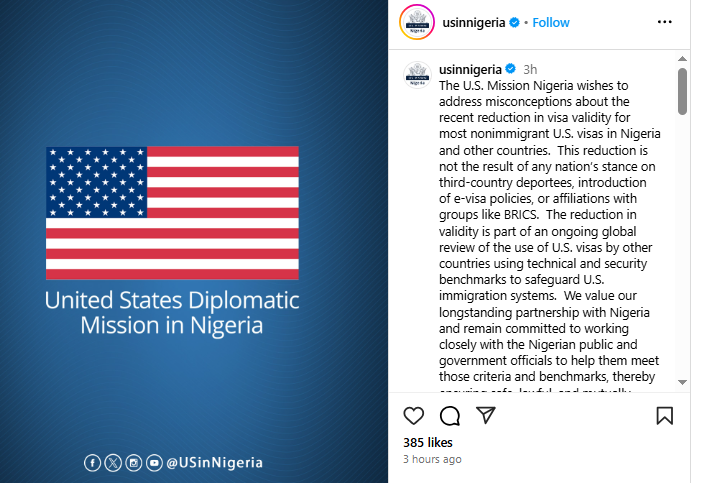At long last, the Nigerian government has found its voice on an issue it allowed to fester and rot for decades. Last Friday, the Minister of Interior, Dr. Olubunmi Tunji-Ojo, announced sweeping reforms aimed at sanitizing the nation’s shambolic visa and expatriate quota system – a cesspool of corruption, incompetence, and deliberate malpractice that has, for years, mocked every pretense of order, national dignity, and sovereignty. But while these long-overdue reforms sound commendable on paper, they reek of institutional hypocrisy, arriving years, if not decades too late.
The minister said these measures would come into effect from May 1, 2025, adding that a moratorium of three months would be given to allow foreigners to regularize their documentations. “Penalty system will be activated after August 1, 2025. We cannot have laws without repercussion for disobedience. And I beg you our expatriates, whatever that you cannot do confidently in your home country, do not try it in Nigeria. I beg you that Nigeria is not a dumping ground. Please, our hospitality should not have the same dictionary meaning of stupidity. Nigeria will not abandon you. But please do not disgrace and mess up Nigeria,” the minister cautioned. He said cleaning up the expatriate and visa administration would require implementation of specific policies on the Combined Expatriate Residence Permit and Aliens Card (CERPAC) and the introduction of a comprehensive insurance scheme that would cover the cost of deporting and repatriating expatriates and end the era of government subsidies.
For far too long, Nigeria’s immigration and expatriate administration has been little more than a lawless bazaar, where expatriates, aided by unscrupulous government officials, have routinely gamed the system with impunity. Visas overstayed for months, even years. CERPAC cards procured by criminals, human traffickers, and economic opportunists with no real skills. Expatriate quotas issued for waitresses, drivers, and human resource managers – positions Nigerians are eminently qualified to fill. A staggering insult to a nation already crippled by mass unemployment and economic decay.
Where, one wonders, was the outrage when these atrocities were being perpetuated? Where was the enforcement muscle when corrupt officials were approving expatriate quotas for drivers and bar staff? How did a sovereign government sink so low that a multinational could smugly file for an expatriate quota to import a waitress, and some complicit bureaucrat would sign off without batting an eyelid?
And now, in 2025, this government wants a pat on the back for doing what any functional nation-state should have done twenty years ago.
The minister spoke of automation, penalties for overstays, and integration with Interpol databases to prevent Nigeria from becoming a haven for international fugitives – a tacit admission that, until now, it very much has been. He railed against the exploitation of tax payers’ money to fund deportations, conveniently forgetting it was his ministry’s abject negligence that allowed these lawbreakers to overstay in the first place. The scale of this dysfunction defies belief. He lamented that Nigeria has only 50,000 officially recorded expatriates whereas the actual number is undoubtedly far higher. Again, whose job was it to regulate and record them? The same Ministry of Interior, now scrambling to mop up the filth it nurtured for decades.
These so-called reform measures, however sternly worded and theatrically presented, are the classic hallmarks of a government reacting to chaos of its own making. Nigeria’s immigration and expatriate administration did not descend into this abyss overnight. It was a gradual, well-documented collapse, abetted by weak leadership, regulatory capture, and endemic graft. The result is a system where laws meant to protect national interest became commodities for sale to the highest bidder.
Even the minister’s bravado-laced remarks betray a tragic irony. His passionate appeal for patriotism and nationalism would be far more credible if successive administrations hadn’t consistently treated those principles as expendable in the face of foreign interests and elite profiteering. It is difficult to preach nationalism to a citizenry that watches its leaders mortgage national dignity for personal gain. Make no mistake, Nigeria’s immigration woes are not administrative oversights; they are crimes against the nation, and those responsible should be held to account.
If the government is truly serious about reform, it must go beyond superficial automation and punitive bans. It must confront the cabal of corrupt officials and middlemen who have turned visa and quota administration into a multi-billion-naira racket. It must prosecute those who, through deliberate negligence and malfeasance, dragged Nigeria’s immigration system into international disrepute.
Until then, these grand pronouncements are nothing more than the latest in a long line of performative rhetoric. Too little, too late, for a nation already paying the price for decades of institutionalized failure.
The Nigerian people deserve better than this. And the world deserves to see a country that values its laws, its sovereignty, and the welfare of its citizens above the sordid commerce of visa racketeering.





